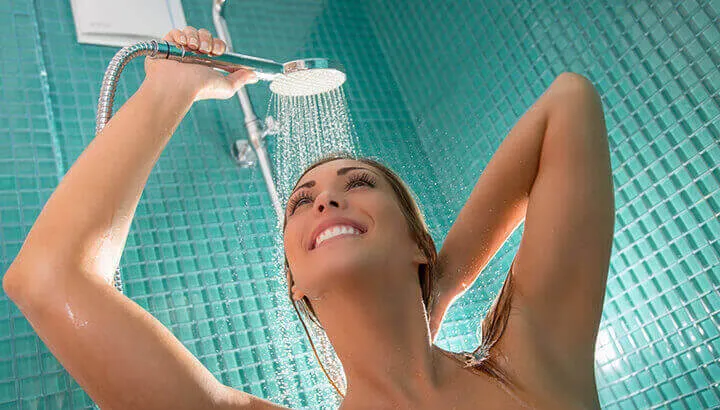
- Share on Facebook142
- Share on Pinterest
- Share on Twitter
At one time or another, you’ve probably jumped into a freezing, cold shower or experienced the water suddenly chill from a toilet flush. Well, it turns out that bone-chilling cold water is actually quite good for your body, skin and mind. From burning fat to relieving depression, here’s why turning the water from hot to cold, at the end of your shower, can benefit you.
Reduces post-workout muscle inflammation
An introduction to a new physical activity, a high-intensity workout or even strenuous chores around the house may be accompanied by sore, stiff muscles the following day. That stiffness is known as delayed onset muscle soreness, a painful musculoskeletal condition that that may occur 24 to to 72 hours after high-intensity activity or exercise. Next time, instead of reaching for anti-inflammatory drugs (which often come with unwanted side-effects) jump into a cold shower.
A study from Santiago, Chile assessed the effectiveness of a cold water immersion after high intensity exercise. Researchers compared cold water immersion to rest for late-onset muscle soreness. Researchers tested participants 24 to 96 hours post-workout. They found that immersion in cold water could effectively decrease delayed onset of muscle pain.
Cold water can lower the temperature of damaged tissue and constrict the blood vessels. This helps reduce the swelling and inflammation, while numbing nerve endings for immediate pain relief. So, by simply taking a cold post-workout shower, you’ll help relieve muscle soreness and inflammation.
Improves your skin and hair

Sure, a hot, steamy shower is relaxing compared to an icy cold shower. But it can also tend to strip necessary oils, thus creating dry, itchy skin. And contrary to popular belief, a hot steamy shower can’t open your pores. Conversely, a cold shower can’t close them either.
Pores lack the necessary muscles for opening and closing. However, a cold shower will prevent the skin’s natural, healthy oil from being stripped. Cold showers also help reduce puffiness, but only temporarily. Any exposure to water strips away the skin’s natural oils, but hot water does it faster. That means the less time spent under water, the better your skin will fair. And, of course, you’re less likely to take a long, leisurely cold shower.
When it comes to your hair, the same applies. Hot, water tends to strip the hair’s natural oils, often leaving it dry and frizzy. But blasting cold water over your head towards the end of your shower will help seal down the cuticle — or outer layer — of each hair shaft. When the cuticle is sealed and lying flat, it’s more translucent. Your hair will glow and appear shinier, less dull, stronger and healthier.
Helps rev your metabolism and burns fat
Cold water showers do tend to get a bad rap, but when it comes to metabolism and fat loss, the pros outweigh the cons. Cold water immersion has been shown to increase metabolic rates because it causes shivering, thus activating the immune system.
And fortunately, you don’t need to be in there a long time. A study from Virginia Commonwealth University found as little as seven minutes of swimming in 60-degree water amped up white blood cell count and increased concentration of helper T cells. Cold water shocks the system and kicks the cardiovascular system into high gear. Therefore, it ramps up the metabolism.
Research published in the New England Journal of Medicine suggests that cold also activates brown fat, which can help burn more calories, boost the metabolism and help eliminate white fat. White fat is the type of body fat that accumulates around waistlines and thighs. The bottom line is, when your body is exposed to cold, it needs more heat to warm you. To warm you, it has to burn more energy. That means burning more fat more efficiently than normal.
Boosts your happiness

Feeling blue? Then jump into a cold shower. It may seem odd, but the benefits may help improve your mood, making you a happier person. A 2007 study from Virginia Commonwealth University found that cold showers can actually help treat depression symptoms. And, when used routinely, they may be more beneficial than prescription drugs.
Cold water, it seems, triggers a flood of mood-boosting neurotransmitters, which naturally make you feel happy.
Research published in the Journal of Circumpolar Health studied the effects of regular winter swimming on the mood of swimmers. It showed that after four months of routine cold water swimming, the participants felt more energetic, active and spritely than the control group. So, the next time you’re feeling down, immerse yourself in cold water.
Helps your lymphatic system
The lymphatic system is a network of vessels that move waste, bacteria and microbes from your cells. Basically, it helps cleanse your body. But unlike the blood, which moves continually throughout your body via the heart, your lymph fluid doesn’t have a central pump.
Instead, your lymphatic system depends on muscle contraction to pump the lymph fluid through the vessels. So, for those who don’t exercise, your lymphatic system becomes slow or inefficient. Fluids can stagnate and toxins accumulate in certain parts of the body. The result: colds, joint pain, infection and disease.
Taking a plunge in cold water causes your lymph vessels to contract, which forces your lymphatic system to pump lymph fluids throughout your body. Fluid is flushed, triggering the immune system’s white blood cells to attack and destroy any unwanted waste.
While cold water immersion is not a substitute for a healthy diet and exercise, it is an excellent additive to your healthcare regime. Conditioning your brain and your body to dive into cold water may be challenging. But if you can muster the courage, the health benefits are well worth it. You can trigger your body’s natural healing powers to support your body, mind and spirit.
In the end, you’ll feel healthier and happier. Turn your taps to cold towards the end of your shower — if only briefly. Eventually, you may even be able to withstand longer and colder showers. The results can be dramatic!
— Katherine Marko
- Share on Facebook142
- Share on Pinterest
- Share on Twitter

